| Srl | Item |
| 1 |
ID:
137366
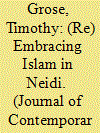

|
|
|
|
|
| Summary/Abstract |
This Xinjiang Class is a four-year, national-level boarding school program established by the Chinese Communist Party (CCP) in the year 2000. The overarching aim of the program is clear: the CCP intends to train a core group of young Uyghurs who have internalized the ideals of the Party. This article, which is based on interviews and regular interaction with over 60 graduates of the Xinjiang Class, casts doubt on whether the boarding schools have been effective in ‘interpellating’ young Uyghurs as compliant members of the Chinese Nation (Zhonghua minzu). This article contends that Uyghur graduates of the Xinjiang Class have instead embraced a non-Chinese ethno-national identity—an identity bound by Central Asian and Islamic cultural norms—and have largely rejected the Zhonghua minzu identity.
|
|
|
|
|
|
|
|
|
|
|
|
|
|
|
|
| 2 |
ID:
063295
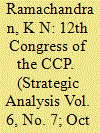

|
|
|
| 3 |
ID:
100520
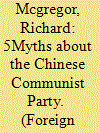

|
|
|
| 4 |
ID:
119191
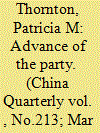

|
|
|
|
|
| Publication |
2013.
|
| Summary/Abstract |
While existing scholarship focuses attention on the impact of state control and repression on Chinese civil society, the increasingly independent role of the Communist Party has been largely overlooked. This article reviews the Party's drive to "comprehensively cover" grassroots society over the previous decade against the theoretical debate unfolding among Chinese scholars and Party theoreticians regarding the Party's role with respect to civil society. Focusing on greater Shanghai, frequently cited as a national model of Party-building, I describe the Party's advance and the emergence of Party-organized non-governmental organizations (PONGOs), a new hybrid form of social organization sponsored and supported by local Party committees. I argue that these developments invite a reconsideration of our understandings of the ongoing "associational revolution" and of the Party's relationship to China's flourishing "third realm."
|
|
|
|
|
|
|
|
|
|
|
|
|
|
|
|
| 5 |
ID:
111276
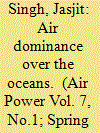

|
|
|
| 6 |
ID:
131217
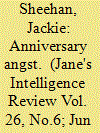

|
|
|
| 7 |
ID:
158945
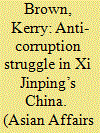

|
|
|
|
|
| Summary/Abstract |
The fact that the extensive anti-corruption struggle that has consumed China since 2013 is highly political is widely accepted and understood. But the question is precisely what political strategy it is directed at – that of bolstering the position of the current supreme leader, Xi Jinping. Or for the preservation of the Party itself. There is a huge difference between these. The first simply means in effect the replacement of one corruptible elite by another. The second means a titanic struggle to change the Chinese communist party culture of power, and to make it enduring and sustainable.
|
|
|
|
|
|
|
|
|
|
|
|
|
|
|
|
| 8 |
ID:
118484
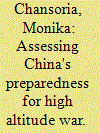

|
|
|
| 9 |
ID:
109737
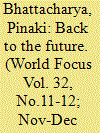

|
|
|
| 10 |
ID:
085852


|
|
|
|
|
| Publication |
2008.
|
| Summary/Abstract |
The Seventeenth National Congress of the Chinese Party (CCP), held on 15-21 October 2007 in Beijing , Produced some interesting changes to the balance of power among different factional groups in Chinese politics.
|
|
|
|
|
|
|
|
|
|
|
|
|
|
|
|
| 11 |
ID:
110994
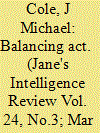

|
|
|
|
|
| Publication |
2012.
|
| Summary/Abstract |
President Ma Ying-jeou faces a difficult task balancing Beijing's expectations for political negotiations with the Taiwanese electorate's vote for the status quo.
|
|
|
|
|
|
|
|
|
|
|
|
|
|
|
|
| 12 |
ID:
151407
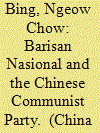

|
|
|
|
|
| Summary/Abstract |
As Malaysia and China have become “comprehensive strategic partners”
since 2013, the bilateral relations of these two countries have been
getting stronger. However, party-to-party relations between the two
countries have not received much scholarly attention. This article
discusses the Chinese Communist Party’s (CCP) interactions with the
Barisan Nasional (BN) coalition and its main component parties,
United Malays National Organization (UMNO) and Malaysian Chinese
Association (MCA) in Malaysia. It discusses the origins of China’s
party-based diplomacy, the actual development in this area of diplomacy
between Malaysia and China, and the implications of this kind of
party-based diplomacy. It suggests that one of the main activities
carried out under party-based diplomacy is for CCP to offer its
governing lessons to other ruling parties, which has not been discussed
much by other analysts of China’s party-based diplomacy
|
|
|
|
|
|
|
|
|
|
|
|
|
|
|
|
| 13 |
ID:
149321
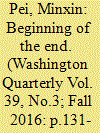

|
|
|
|
|
| Summary/Abstract |
One of the most remarkable developments in contemporary international affairs is the rapid shift of outsiders' perception of China. Not too long ago, people believed the East Asian behemoth was on an inexorable path to glory and power.11. See Martin Jacques, When China Rules the World: The End of the Western World and the Birth of a New Global Order (New York: Penguin 2012); Daniel A. Bell, The China Model: Political Meritocracy and the Limits of Democracy (Princeton: Princeton University Press, 2015).
View all notes
In the last few years, however, this view has changed dramatically; China no longer appears to be a confident great power progressing in the direction of greater openness and more reform. Instead, the country, ruled by an insecure, repressive, and inward-looking regime, has embarked on a path that is foreclosing possibilities of its evolution into a responsible great power with a more humane domestic political system.
|
|
|
|
|
|
|
|
|
|
|
|
|
|
|
|
| 14 |
ID:
168017
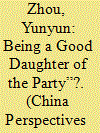

|
|
|
|
|
| Summary/Abstract |
Like other socialist institutions surviving in China’s market reforms, the All-China Women’s Federation (ACWF or WF when referring to its local branches), as the only state-sponsored organisation representing women’s interests, has been constantly refashioning itself to meet new existential challenges. In July 2015, the central leadership of the Chinese Communist Party commanded a new wave of mass organisational reforms, in which the Women’s Federation’s alienation from the grassroots and a weakening representation of women’s interests were questioned. After three years of intensive reform, are the local structures of the ACWF being substantially improved to reconnect to its mass base? Drawing from extensive fieldwork in three provinces and a neo-institutional analysis, this article argues that in the short term, although the reform serves principally as a consolidation of Party authority, local Women’s Federations are creatively using the reform to expand their popular base and broaden their representativeness. In the long term, however, local WFs are facing unreformed institutional problems such as political marginalisation, bureaucratisation, and ineffective implementation, which stagnate further development of China’s state feminism.
|
|
|
|
|
|
|
|
|
|
|
|
|
|
|
|
| 15 |
ID:
115865
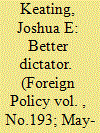

|
|
|
| 16 |
ID:
113102
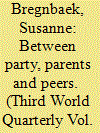

|
|
|
|
|
| Publication |
2012.
|
| Summary/Abstract |
This article explores the lived contradictions entailed in being a young member of the Chinese Communist Party (ccp) today. The focus is on how political and existential issues intersect. It explores party membership as a strategy for personal mobility among Beijing elite university students by providing an ethnographic account of the quandaries of two young ccp members. Even though one student is of rural origin and the other has an urban elite background, in both cases party membership has been pursued as a strategy for opening paths to the future and tied to a quest for self-development rather than a matter of wishing to make sacrifices for the country. The article focuses on how the two students' efforts play out differently. At the same time it is argued that a sense of moral and existential ambiguity goes hand in hand with both of their party membership strategies, leading to an experience of division.
|
|
|
|
|
|
|
|
|
|
|
|
|
|
|
|
| 17 |
ID:
193515
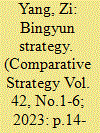

|
|
|
|
|
| Summary/Abstract |
This article explores the evolution and application of the Chinese Communist Party’s (CCP) bingyun strategy pre-1949. Developed by Chinese and Soviet thinkers, bingyun or “Soldier Movement” aimed to subvert opposing armed forces to either bring them under CCP command or cause them to self-destruct. The bingyun strategy was practiced throughout the revolutionary period with lasting legacy in present-day China. By examining cases from the First Kuomintang-CCP United Front, First Phase of the Chinese Civil War, Sino-Japanese War and the Second Phase of the Chinese Civil War, this article demonstrates how bingyun adapted to changing circumstances and its far-reaching consequences for CCP military success that realized its takeover of China in 1949.
|
|
|
|
|
|
|
|
|
|
|
|
|
|
|
|
| 18 |
ID:
115088
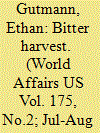

|
|
|
|
|
| Publication |
2012.
|
| Summary/Abstract |
When Wang Lijun made his break for the US consulate in Chengdu on the night of February 6th, he was in a unique position to reveal a series of damaging stories about his superior, Bo Xilai: Bo's familial connection to the suspected murder of British businessman Neil Heywood, siphoning of Chongqing's public funds, and shakedowns of local criminal and triad elements. As former head of the Chongqing Public Security Bureau, Wang also knew that Bo, as Chongqing party secretary, had engaged in surveillance of Politburo members, potentially implying that Bo and other players aligned with Jiang Zemin's faction-most prominently, Zhou Yongkang, secretary of the powerful Political and Legislative Affairs Committee (PLAC)-were thinking about seizing power. Faced with the complexity of China's leadership transition crisis, most Western editors played up the Sopranos aspect of the sordid tale, fixing on the alleged Heywood murder, essentially the same interpretation being relentlessly pushed by the Chinese Communist Party-controlled media, and allowed an even more sinister story to slip by virtually unnoticed. On March 23rd, China's vice minister of health, Huang Jiefu, publicly declared the country's intention to end "organ donations" from executed prisoners. Yet the euphemism didn't conceal the reality, for on the night of February 6th, Wang was in a unique position to reveal one more story-specifically, how the party has been harvesting the organs of their political enemies for years.
|
|
|
|
|
|
|
|
|
|
|
|
|
|
|
|
| 19 |
ID:
066918
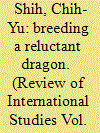

|
|
|
| 20 |
ID:
126156


|
|
|
|
|
| Publication |
2013.
|
| Summary/Abstract |
In May 1949 the Chinese Communist Party seized Shanghai. Rather than being elated at the prospect of harnessing the economic power of China's largest city to complete the revolution, the Communists approached it cautiously. How would the Chinese Communist Party set about transforming this free-wheeling port city with a 'semi-colonial' past into an orderly and socialist city? How would it balance ideology and pragmatism in reshaping Shanghai? This paper uses the takeover of two British companies as case studies to explore these issues at the ground level. It is argued that the means by which these companies were transformed tell us much about the Party and its state-building policies. When cadres entered foreign companies, their priority was not radical change and anti-imperialism, but rather fostering a sense of stability and unity to avoid disrupting production. Their gradual approach was due in large part to the Party's awareness of its own limited skills, resources and manpower, but also to its leaders and cadres recognizing that before they could remake Shanghai anew they had first to deal with the material and human legacies of the past.
|
|
|
|
|
|
|
|
|
|
|
|
|
|
|
|